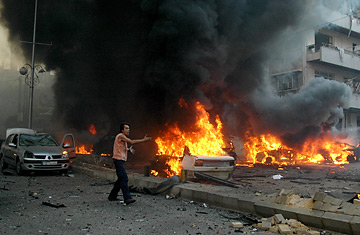
A Lebanese civilian gestures in front of burning cars at the site of a car bombing in a Christian suburb of Beirut that killed anti-Syrian Lebanese deputy Antoine Ghanem, September 19, 2007.
Antoine Ghanem, an anti-Syrian Lebanese lawmaker, was killed Wednesday when a suspected car bomb exploded beside his Chevrolet in a leafy suburb of east Beirut, setting the vehicle ablaze along with at least a dozen others and killing some nine bystanders. His death will complicate the scheduled election of a new President next Tuesday and further polarize the warring anti-Syrian and pro-Syrian factions here whose bitter feuding has stalemated the country for almost a year.
In practical political terms, Ghanem's death has reduced to just three the slim lead held in the 128-seat Lebanese parliament by the anti-Syrian majority known as the March 14 block, which forms the backbone of the Western-supported government. Lebanese parliamentarians are expected to convene on September 25 to elect a new president. The current incumbent, Emile Lahoud, a close ally of Damascus, is due to step down on November 24. Most analysts doubt that the election will be held on Tuesday and expect the crisis to continue right until the end of Lahoud's term.
The blast was heard throughout east Beirut and a tall plume of thick black smoke rose into the early evening sky. The bomb exploded at a junction of a main street filled with rush hour traffic. Broken glass and masonry blasted from adjacent apartment buildings and office blocks littered the street as firemen doused the flames of burning vehicles. A cordon of green-bereted Lebanese troops sealed off the area from an angry and anxious crowd. "There's blood everywhere, blood, blood," cried a distraught Ziad Ghosn, eyeing a crimson trail in the bomb-blasted ruins of his brother's apartment, which lay above the explosion.
Makram Azzi, 65, a retired pilot for Middle East Airlines, Lebanon's national flag carrier, said the blast tore his front door from its hinges. "What can you do? This is a war," he said, still visibly shaken. Ghanem, 64, had returned to Beirut from the Gulf only two days earlier. Like many anti-Syrian legislators, he had spent the summer months abroad out of safety concerns. Eight prominent anti-Syrian figures have been killed in a series of assassinations since February 2005 when former Prime Minister Rafik Hariri died in a massive truck bomb blast. Many Lebanese have blamed Syria for the killings and an ongoing United Nations investigation has suggested that Damascus was responsible. Syria has denied any involvement in the assassinations.
The U.S. was swift to link Ghanem's murder to the previous killings. "There's been a pattern. This would seem to fit into the pattern," White House spokeswoman Dana Perino said, pointing to the murder of people "who publicly sought to end Syria's interference in Lebanon's internal affairs."
The March 14 block and the pro-Syrian opposition led by the powerful militant Shi'ite Hizballah have been at loggerheads for months over the identity of the next President. In Lebanon's sectarian power-sharing system, the presidency is reserved for Maronite Catholics. Several contenders have announced their candidacy, although no clear consensus has yet emerged that would satisfy both factions. The March 14 block is pushing to elect one of their own, but the opposition has threatened to form a second rival government if an acceptable candidate is not found.
Beirut has played host to numerous visiting dignitaries in recent days, each one attempting to resolve the stalemate and defuse the lingering fear of civil conflict breaking out. U.S. officials publicly maintain a neutral stance, saying only that the election should be held on time and without foreign meddling, a reference to Syria. But there is little doubt that Washington prefers a President who will continue to uphold Lebanon's independence from Syria and will seek to implement U.N. resolutions calling for the disarming of Hizballah, regarded by the U.S. as a terrorist organization. On the other hand, Syria, and its ally Iran, seem to be angling for a weak President who will not challenge Hizballah's armed status and who will oversee the formation of a new coalition government in which the opposition has a greater say.
The stakes are high and the outcome will have an impact far beyond Lebanon's narrow borders. And that is why some Lebanese fear that the bomb blast is a grim portent for what lies ahead.
